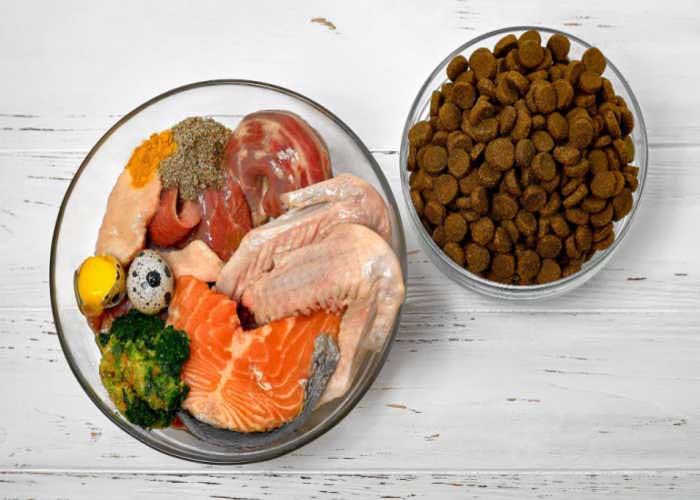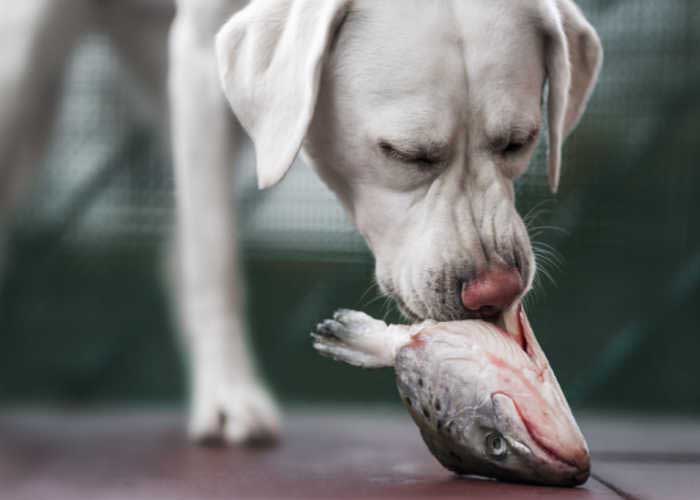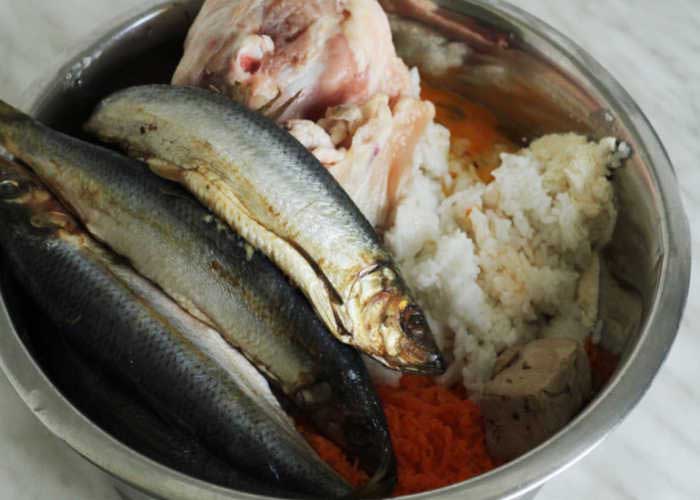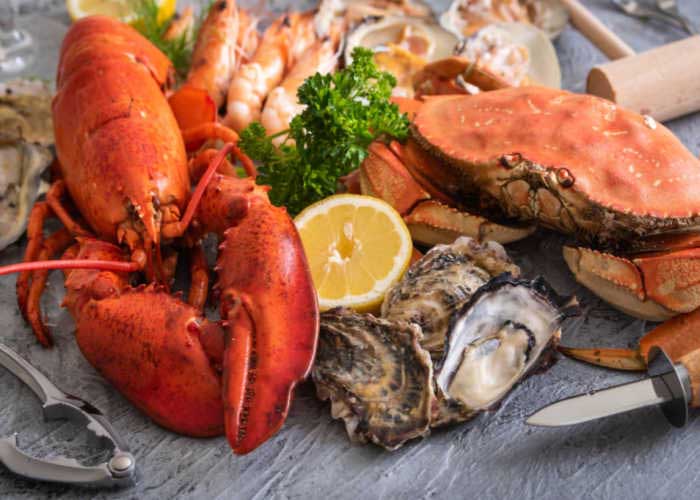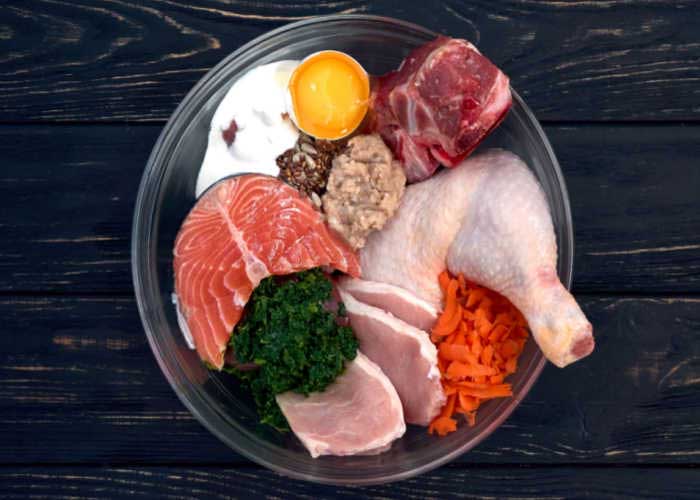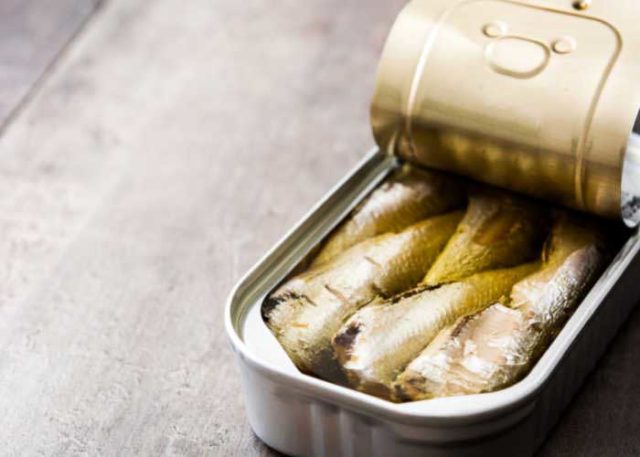
Table of Contents
- Can Dogs Eat Sardines? But First, What Makes a Raw Dog Food Good?
- Is the Raw Dog Food an Ideal Meal Plan?
- How Much Raw Dog Food Should You Feed Your Dog?
- Can Dogs Eat Fish as Raw Dog Food?
- Can Dogs Eat Other Seafood as Raw Dog Food?
- What Does Research Show about Raw Dog Food?
- FAQS about Raw Dog Food
- Raw Dog Food: Sardines and Other Seafood—Final Thoughts
Changing your dog’s nutrition plan with raw dog food? How about adding sardines and other seafood to your fur baby's diet?
We understand that you want to make sure you are choosing the best diet food for your dog. However, we are presented with a mind-blogging array of options, all claiming to be healthy and affordable.
Conflicting pieces of advice make it even worse!
It can be hard to determine which food diet for dogs is best since there are factors to keep in mind when deciding what to feed your pup.
The best dog food for your fur baby should meet his nutritional needs. There may be compelling reasons for choosing cooked food, kibbles, and canned foods, but today, we will be focusing on feeding raw food diet for dogs.
Can Dogs Eat Sardines? But First, What Makes a Raw Dog Food Good?
It is entirely okay to give your dog a pure kibble diet. But, if your furry friend has specific dietary needs, raw food can help provide your dog with the additional nutrients to stay healthy and strong.
For a healthy and happy canine companion, advocates of the natural diet acknowledge the benefits such as higher energy levels, healthier skin, shinier coats, and improved mental health.
A raw diet for dogs contains nutrients in their natural state readily absorbed when your pooch eats, resulting in smaller, easier-to-release, and less smelly stools. It also supports healthy gut bacteria that aid digestion.
Is the Raw Dog Food an Ideal Meal Plan?
The best meal plan is what works best for you and your fluffball. If you are thinking about switching to raw meat for dogs, it’s always a good idea to consult first with your veterinarian.
You may leave your pet with an upset stomach with sudden diet changes!
A raw diet usually includes organ and muscle meats, bones, raw eggs, dairy products like yogurt, dog-safe fresh fruits, and vegetables.
It can be homemade, store-bought, dehydrated, or freeze-dried dog food. Either way, they are far more beneficial than the refined carbohydrates, additives, synthetic nutrients, and chemicals found in highly processed food.
Processed dog food has fillers and preservatives included that offer no nutritional value and are not biologically appropriate for your dog. They are cooked at unnaturally high temperatures, losing many nutrients.
Raw food enthusiasts claim that the natural properties of a raw meat diet for dogs provide a solid foundation for their pet’s health.
How Much Raw Dog Food Should You Feed Your Dog?
Dog obesity is a growing concern since many owners overfeed their pets.
Follow a regular feeding schedule and split the food between two meals. Food intake should be appropriate to your pup’s age with your veterinarian’s approval and supervision.
Let the experts help determine what is best for your dog’s well-being.
Can Dogs Eat Fish as Raw Dog Food?
We know that fish is a good source of vital nutrients, vitamins, and protein. It is one of the healthiest foods humans consume.
But does it benefit dogs in the same way? Is it safe to add raw fish to your dog’s diet?
Let’s get into the facts.
Fish is often added as an ingredient in commercial dog food as an alternative protein source. It is also a good alternative for dogs with food allergies, sensitive stomachs, and dietary restrictions.
However, this does not mean that dogs can safely eat just any fish you throw their way.
There may be many fishes in the sea, but there are those that you need to avoid due to heavy metals contained like mercury.
Mercury build-ups in the fish’s system, like tuna and swordfish, can lead to toxicity.
The common types of fish used in dog food companies are salmon, ocean or lake whitefish, walleye, herring, arctic char, and flounder.
RELATED: What Fish Can and Can’t Dogs Eat?
Switching to a Different Protein Source
Feeding fish is an easy way to increase your fur baby’s protein intake without adding extra calories. More importantly, it is an excellent source of vitamin D and omega-3 fatty acids.
Raw fish preserves essential minerals and oils that are lost through the cooking process.
So, is raw fish safe for your furry friend? Yes, as long as the fish is not a species prone to high levels of mercury (such as tuna), then you are good to go.
In fact, people and animals have eaten raw fish with no ill effects for thousands of years. Humans, though, are quite concerned about parasites.
The way you prepare the meal can cause problems, not the fish itself. To avoid contamination, make sure that you purchase from accredited shops.
Take the appropriate precautions suggested by the FDA, such as meticulous care in the preparation and sanitation of raw food to prevent the risk of carrying harmful bacteria.
- Wash your hands thoroughly with soap and water.
- Clean and disinfect all objects and surfaces that come in contact with raw dog food.
- Freeze raw food until ready to use.
- Separate raw meat for dogs from other food.
- Either you cover and refrigerate the unfinished food or you throw leftovers out safely.
On top of that, moderation is the key. Too much of everything, even a good thing, can become a problem.
You can achieve great health benefits with a recommended serving of a healthy fish choice.
Limit fish and fish oils that you add to your pup’s diet. They should be used as a supplement and in small portions.
Too much fish may cause harm. Thus, a fish or seafood-heavy diet for dogs is not advisable.
Sardines for Dogs on a Raw Diet
Now, let us discuss one of the dog’s absolute favorites: sardines!
Sardines are great for dogs. They are actually one of the best types of fish to share with your canine companion.
Not only are they safe, but sardines are also full of essential nutrients.
To begin with, your pooch can consume this small, nutrient-rich, oily fish to prevent cancer as it is naturally rich in vitamin D. This vitamin allows your dog’s body to balance minerals like calcium and phosphorous for healthy growth.
In addition, sardines are also a great source of vitamin B-12, which is crucial for the formation and growth of blood cells, as well as for a healthy nervous system and brain function. This vitamin also maintains healthy digestion.
Sardines are an abundant source of omega-3 fatty acids that support the brain development of puppies. It boosts the heart and kidney health of canines and improves their skin and coat health.
In conclusion, these nutrients support all functions of your pup’s body. Adding sardines to your pet’s raw diet can offer benefits and positively impact its health.
Canned vs Fresh Sardines for Dogs
Fresh food offers the best source of nutrients, but fresh sardines aren’t always available. It’s not even a cost-effective choice, so you may have canned sardines.
Although canned, it’s best to keep it as natural as possible with no additives. It is important to note that when purchasing from raw dog food companies, look for brands packed in water that contain no added salt.
If you can source fresh sardines, they might be larger than the canned ones. Keep in mind to remove the backbone to prevent the risk of choking.
Potential Health Risk of Sardines for Dogs
Sardines are a very healthy supplement for dogs, but that doesn’t mean they don’t have a trace amount of mercury.
As a matter of fact, all fish has it. So, is your fluffball at risk of mercury toxicity from feeding fish?
Mercury is in the ocean and absorbed by every organism living in it. From plankton to whales, mercury is stored in their bodies.
Larger fish like mackerel have much higher mercury levels than small fish like sardines. So, you can safely feed sardines to your dog in moderation.
Although mercury poisoning is low with sardines, this doesn’t completely eliminate the risk.
Gradually, it will accumulate in your pet, so it’s crucial to limit the fish to give time for your dog’s body to eliminate mercury through his urine and waste.
Can Dogs Eat Other Seafood as Raw Dog Food?
Dogs do best with finfish, whereas raw shellfish can carry intestinal parasites.
Oysters, for example, are a good source of copper and zinc but contain high levels of bacteria, viruses, and algae if not cooked.
When properly cooked and thoroughly cleaned, your fur baby can eat other types of ocean dwellers, like crabs, shrimps, scallops, and lobsters. But remember to completely remove the shell, legs, and tails to avoid choking.
Even when cooked, feeding shellfish as a meal is not advisable.
Lobsters are high in fat and full of sodium. Crab meat is high in iodine, while shrimps are often full of harmful toxins.
Dogs can enjoy cooked shellfish as a snack or special treat or as an ingredient in dry food.
With all things considered, a few bites will do and won’t harm your furry friend. Still, it’s better to be safe than sorry.
What Does Research Show about Raw Dog Food?
According to Purina, raw fish is bad for dogs to eat as it can carry parasites harmful to your dog’s health. Thus, raw or uncooked fish is not sensible to feed your dog.
The American Veterinary Medical Association opposes the unregulated feeding of a raw meat diet for dogs. They discourage pet owners from using unprocessed meat and dairy as they carry pathogens like E. coli and listeria, which can make pets sick and harm people with weak immune systems.
The FDA Center for Veterinary Medicine has the same concern as they studied samples of commercially available raw dog food. Their investigation noted that a large percentage of the raw food tested was positive for pathogens.
Like some bacteria, pathogens are disease-causing germs. Based on the study’s results, raw pet food diets are a public health risk.
On the other hand, some vets favor gently cooked food as these diets are minimally processed and nutritionally balanced.
Still, many fur parents choose the raw diet since they don’t trust commercial dog food and believe alternative pet foods are healthier.
Feeding raw meat lets them control their dog’s nutrition with highly digestible nutrients from fresh, real food.
FAQS about Raw Dog Food
Is raw dog food better for dogs?
Raw food advocates claim the diet is healthier for their pups as dogs are biologically designed to eat raw food.
The bones can be good for the dog’s dental health, while the meat is more nutrient-dense, leading to smaller poops. Thus, raw dog food is safe.
But making a raw diet for puppies from scratch takes a lot of effort. You need to follow feeding guidelines to avoid weight gain and nutritional imbalances.
How do I start feeding my dog with raw dog food?
Feed a small raw minced meat to check you’re not dealing with dogs with allergies. Gradually increase the amount until it is ready for 100% raw meal.
Do vets recommend raw dog food?
Some veterinarians warn that raw meat diets are not appropriate because of the risk they have to both pets and owners.
Salmonellosis and other infections can affect people with whom the dog shares the home.
Raw Dog Food: Sardines and Other Seafood—Final Thoughts
Fish deserves to be in your pup’s food bowl due to its nutrient composition.
Although dogs have much to gain from having seafood on the menu, some marine creatures are just not worth the risk.
Whether you’re feeding raw dog food or a cooked meal, it is vital to prepare it the right way. Whenever introducing something new, start with small portions to eliminate the potential side effects.
In choosing food for your dog, you need to consider your pup’s activity level, age, size, and food allergies. Your lifestyle also matters if you have the time to spend preparing or shopping for your dog.
So, what should you feed your dog?
The best dog food is up to you to decide. Dogs don’t get to choose what they eat, so as owners, we choose what we think is best for our pup’s health.
Every dog has its unique dietary requirements, so it is important to remember that not all dogs have the same nutritional needs.
But, of course, this is not a substitute for medical advice.
Your vet has the answers about pet nutrition. They are a valuable resource to help you narrow down your options regarding your dog’s food.
A consultation gives peace of mind as it ensures you are giving good raw food for dogs to provide a complete and balanced diet your pooch needs to thrive.



